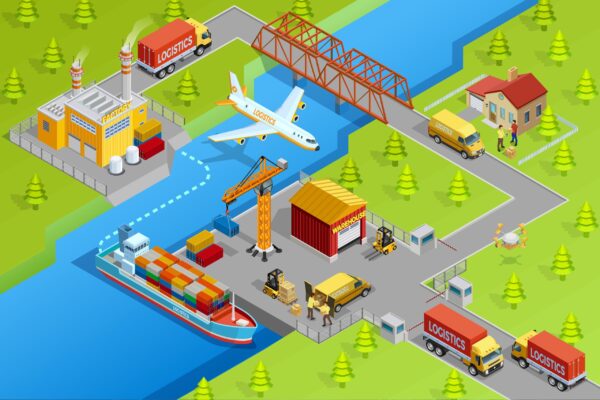Freight Forwarding Process – A Complete Guide
Freight forwarding plays a key role in global trade. It ensures that goods move efficiently from one place to another. Businesses rely on freight forwarders to handle shipping, documentation, and logistics. Without them, transporting goods across borders would be complex and time-consuming.
A freight forwarder acts as an intermediary between the shipper and transportation services. They arrange shipments via air, sea, rail, or road. Their expertise helps businesses save time and avoid shipping issues.
Freight forwarding is also a crucial part of supply chain management. It ensures seamless movement of goods from suppliers to customers.
This guide will explain the freight forwarding process in detail. We will cover what a freight forwarder does, their responsibilities, and the step-by-step process of freight forwarding. By the end, you will understand why freight forwarders are essential for smooth logistics.
What is Freight Forwarding?
Freight forwarding is the process of arranging the shipment of goods from one place to another.
A freight forwarder manages the entire logistics process on behalf of businesses or individuals. They coordinate with carriers, handle customs procedures, and ensure timely delivery.
How Freight Forwarding Works
Freight forwarders do not move goods themselves. Instead, they work with shipping lines, airlines, trucking companies, and rail services. Their job is to plan and execute the best shipping strategy for their clients.
They handle documentation, negotiate freight rates, and provide tracking services. Whether shipping within a country or internationally, freight forwarders make the process smooth and hassle-free.
Importance of Freight Forwarding
Freight forwarding simplifies logistics for businesses. It helps companies focus on their core operations instead of worrying about shipping. With their expertise, freight forwarders reduce risks and ensure goods reach their destination on time.
Responsibilities of a Freight Forwarder
A freight forwarder performs several critical tasks to ensure smooth transportation. Here are some key responsibilities:
1. Arranging Transportation
Freight forwarders select the best transportation mode based on cost, speed, and cargo type. They book space on ships, planes, or trucks as per client needs.
2. Managing Documentation
Proper documentation is essential for smooth shipping. Freight forwarders prepare and verify invoices, bills of lading, customs forms, and other required documents.
3. Customs Clearance
Customs clearance is a complex process. Freight forwarders handle duties, taxes, and compliance requirements to ensure goods pass through customs without issues.
4. Cargo Insurance
Freight forwarders offer cargo insurance to protect shipments from loss or damage during transit.
5. Warehousing & Storage
Sometimes, goods need to be stored before shipping. Freight forwarders arrange warehousing and storage facilities as needed.
6. Tracking Shipments
Real-time tracking is crucial in logistics. Freight forwarders provide tracking services so clients can monitor their shipments.
7. Handling Risks and Delays
Unexpected delays can occur due to weather, customs issues, or other factors. Freight forwarders help resolve these challenges efficiently.
The Process of Freight Forwarding
The freight forwarding process involves several steps. Each step ensures a smooth transition from the point of origin to the final destination.
1. Shipment Planning
The process starts with planning. The freight forwarder discusses the client’s shipping needs, cargo type, and delivery timeline. They determine the best route and transportation mode.
2. Booking and Carrier Selection
Once the plan is finalized, the freight forwarder books space with the chosen carrier. They consider factors like cost, transit time, and reliability.
3. Cargo Packaging and Labelling
Proper packaging ensures goods are safe during transit. Freight forwarders guide clients on packaging requirements and labelling for customs compliance.
4. Export Customs Clearance
Before goods leave the country, they must clear customs. The freight forwarder submits required documents and pays duties or taxes on behalf of the client.
5. Goods Transportation
Once cleared, the goods are transported via air, sea, road, or rail. Freight forwarders coordinate the movement and keep track of shipments.
6. Import Customs Clearance
When goods arrive at the destination, they go through customs again. Freight forwarders handle all paperwork and ensure compliance with regulations.
7. Warehousing and Distribution
If required, the freight forwarder arranges storage before final delivery. They also manage distribution to ensure goods reach the correct recipient.
8. Final Delivery
The last step is delivering the goods to the final destination. The freight forwarder ensures safe and timely delivery.
Cargaison Express: Your Logistic Outsourcing Partner
Freight forwarding is essential for businesses involved in global trade. It simplifies shipping and ensures smooth delivery. From arranging transportation to managing customs clearance, freight forwarders handle every step efficiently.
At Cargaison Express, we provide expert logistic outsourcing services to our clients. Our team ensures hassle-free logistics for your business. Whether you need help with documentation, customs clearance, or transportation, we have you covered.
Looking for a reliable logistic outsourcing partner? Contact Cargaison Express today! Let us handle your shipping needs while you focus on growing your business.





